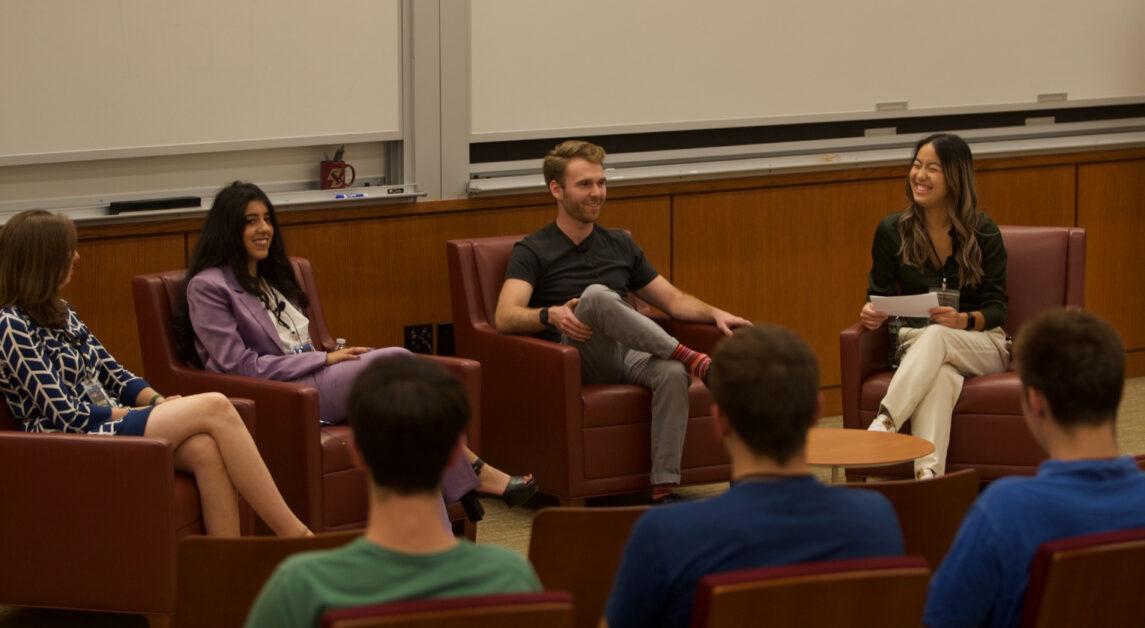The three-day event was designed to promote entrepreneurial thinking and skills through workshops, speakers, and networking, according to its website.
“[The conference] is a huge celebration of entrepreneurship, start-ups, BC, and tech,” said Alex Park, MCAS ’24, co-chair of Start@Shea. “There’s a lot of talent in so many different pockets of the country. … We’re trying to make BC the place for entrepreneurship in the country.”
One of the conference’s primary events was the “ideathon,” an activity where attendees formulated entrepreneurial solutions to various problems based on a given prompt. Park said the ideathon’s main goal was to mimic real-world situations, so halfway through the activity participants learned their prompt had shifted.
“Things don’t always go as planned, and you have to keep that into account as you move forward,” Park said. “We really just want to dive deep into their creativity and see how they can create real solutions out of problems that exist in the world.”
Meagan Loyst, BC ’19, and Jason Alvarez-Cohen judged each group’s ideas. Loyst, an associate at the venture capital firm Lerer Hippeau, and Alvarez-Cohen, a former software developer at Boeing and co-founder and CEO of Popl, judged each group’s presentation based on creativity, practicality, and delivery.
A proposed app called “Pharmalink” won the competition. The app is aimed to be a networking platform that would expedite the research process for medicine by helping researchers across different institutions collaborate on pharmaceutical development.
Ivan Lubyanitskiy, a member of the group that thought of Pharmalink and CSOM ’25, said that the event pushed his creativity and problem-solving skills.
“I was able to bounce around ideas and build them from the ground-up with like-minded entrepreneurial individuals,” he said. “In this environment, I felt more comfortable to share my ideas.”
Conference attendees also attended lectures from professional venture capitalists—institutions that invest in promising start-ups. Speakers shared their thought processes and how they adapt to the latest trends in the industry.
Loyst described the importance of self-advocacy in initiating a career, revealing that she received her current job by keeping in touch with the firm after her job application was rejected.
“It spiraled and spiraled, and then I ended up being the youngest person to interview,” Loyst said. “I think, whenever you’re young and constantly underestimated, you have to minimize your risk profile. Even though I was the youngest person interviewing for the job, I was sending her more deals than everyone else. … These small things helped me prove my worth.”
Loyst also explained that forming long-term relationships was vital to her job. Taking the effort to maintain connections can lead to being considered for exciting new business opportunities, she said.
“Your job as an investor is to be a positive influence in the ecosystem,” Loyst said. “Whether you’re investing in a company or not, you need to be maintaining connections with the company because that’s your reputation.”
Other panelists also emphasized the role of making connections in their jobs. Sam Loui, a coordinator at TechStars, explained that attending networking events increases the amount of time venture capitalists must commit to work, throwing off a normal work-life balance.
“Even though it feels like I do a nine-to-five with lots of team meetings, I’m going to events usually after that, so a lot of times I’ll be out from 6 to 10 after,” Loui said. “As you’re heading out into your careers, start thinking about what it is that you’re looking for in a job. … Ask yourself if the things you like to do and want to do are worth doing.”
Loui also described inclusivity issues within the world of venture capitalism, especially regarding gender equality.
“I have all these stories … where I was the only woman in the room,” Loui said. “People would go to me as the person taking notes, the person who doesn’t get a seat at the table. I became very focused on building a community of women who could tell me about their stories.”
Allison Byers, founder and CEO of Scroobious, said that solving such systemic issues also requires external solutions. She said that the goal of her startup is to help underrepresented founders receive investment.
“Women get 2 percent of [venture capital] dollars, Black founders get 1.6 percent, LatinX get 2 percent, and those all indicate a systemic issue,” Byers said. “It can make a meaningful difference for founders to get money into the hands of those who have investable ideas and just don’t know how to present themselves or how to approach investor networks.”
Byers summarized the startup process with words of warning, encouraging attendees to pursue their dreams but preparing them for a difficult path.
“This is a life that not very many people pick for a reason: it’s really risky,” Byers said. “You’re responsible for bringing something new into the world. You’re responsible for the people that you pay to work there and their livelihood. You’re responsible for your customers and making sure you’re satisfying what they need, responsible to your investors in performing the way they want you to. It’s a lot, but if you love it, you love it.”



















